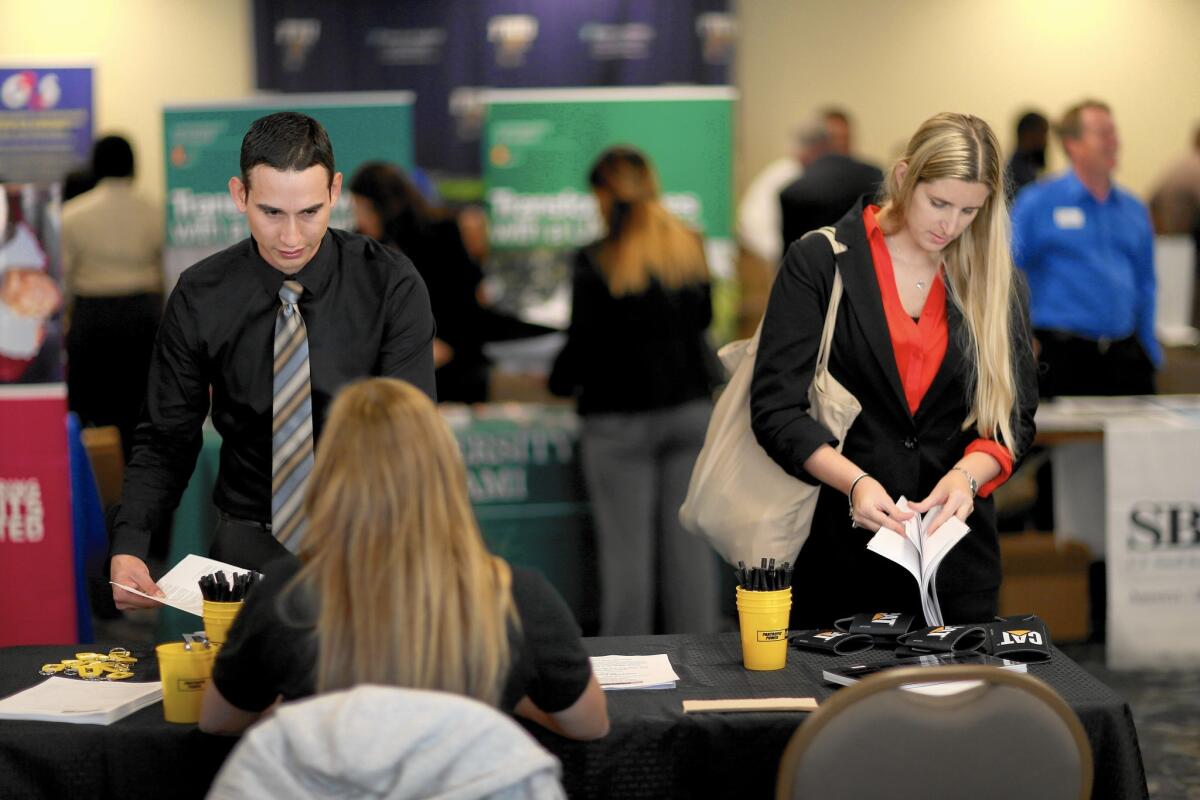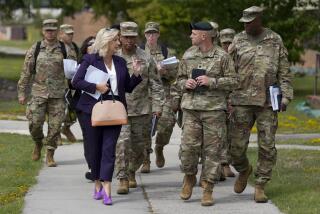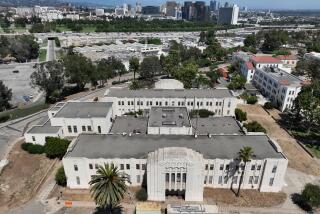High veteran unemployment appears to be in the past, but the push for more hires continues

Antonio Sandoval and Pamela Springle search for positions in the civilian workforce at a veterans jobs fair in Miami this year.
- Share via
Wal-Mart says it met its goal of hiring 100,000 military veterans and has upped its commitment to 250,000.
A coalition of more than 200 other companies has scrapped its original objective of hiring 100,000 vets and vowed this month to make a million hires.
And a separate campaign by the U.S. Chamber of Commerce Foundation, called Hire 500,000 Heroes, has surpassed that target and collected promises from more than 2,000 businesses to hire at least 200,000 more veterans or their spouses.
NEWSLETTER: Get the day’s top headlines from Times Editor Davan Maharaj >>
Yes, corporate America loves veterans. There’s just one problem: Most of them already have jobs.
“They won’t be able to hire a million veterans anytime soon,” Jeffrey Wenger, a public policy expert at the Rand Corp. think tank in Santa Monica, said of the corporate pledges. “There aren’t a million veterans to hire.”
High veteran unemployment, once rampant among those returning from Afghanistan and Iraq, appears to be a thing of the past, based on data from the Labor Department.
The most recent unemployment rate for veterans who served after the terrorist attacks on Sept. 11, 2001, was 4.6% — essentially the same as the rate for nonveterans. That’s 142,000 recent veterans out of work. An additional 280,000 veterans from other eras are also without jobs.
Overall, 3.9% of the 10.8 million veterans in the U.S. labor force were unemployed in October, a rate that economists say is largely attributable to routine turnover in the job market.
The corporate hiring campaigns, however, are not declaring victory. They say the unemployment rate in the general population should not be the bar for veterans.
“Until every veteran who wants a job is hired, our work is not done,” Ross Brown, head of military and veteran affairs at J.P. Morgan Chase, said in an email.
In 2011, the company helped launch the 100,000 Jobs Mission, now called the Veteran Jobs Mission. With about 200,000 service members leaving the military each year, Brown said, the campaign is confident it will eventually reach its new goal of a million hires.
“We’re not putting a timetable on this,” he said.
Federal, state and local government efforts are not letting up either. Veterans continue to get preference for federal jobs, and federal contractors are expected to employ a certain number of veterans.
It’s good PR to say you’re hiring veterans. Everybody wants to support veterans. That’s the main motivation for this.
— Chris Tilly, an economist who directs the UCLA Institute for Research on Labor and Employment
A White House initiative known as Joining Forces announced this year that it had secured new commitments from the private sector to hire or train 90,000 veterans and military spouses, in addition to 100,000 already brought on board.
In Los Angeles, Mayor Eric Garcetti announced this summer that his initiative to hire 10,000 veterans was halfway to its goal. L.A. County supervisors approved a measure last week encouraging major contractors to hire more veterans.
The employment situation has changed sharply from five years ago, when the country was in the grips of recession, U.S. troops were still immersed in Afghanistan and Iraq, and being a recent veteran seemed to be a disadvantage in the job market.
Many employers hesitated to hire reservists, who could be deployed at any time. The stigma of post-traumatic stress disorder is also thought to have hurt job prospects.
The youngest veterans fared worst, with unemployment rates in some months that were double those of other workers their age. But the latest data show that among 18- to 24-year-olds, unemployment rates for veterans and nonveterans were statistically equal, at just over 10%.
Research suggests the turnaround is largely due to timing. A growing share of recent veterans have been out of the military long enough to find work.
Historically, veterans have long been better-employed than the general population. Being accepted into the military and getting out with an honorable discharge is an accomplishment that many employers value.
To a large extent, the promises to hire veterans simply highlight what companies would be doing anyway. Veterans make up about 7% of the labor force.
“It’s good PR to say you’re hiring veterans,” said Chris Tilly, an economist who directs the UCLA Institute for Research on Labor and Employment. “Everybody wants to support veterans. That’s the main motivation for this.”
The hiring campaigns release too little data to evaluate their true contribution to the cause of veteran employment. Most notably, the hiring numbers they report do not distinguish between veterans of the recent wars — who make up about 28% of veterans in the workforce — and those of older generations.
It is difficult to know whether the hiring pledges go beyond what would happen anyway in the normal flow of the economy, because the campaigns release too little data to evaluate them.
Wal-Mart provided figures showing that the 110,000 veterans it has hired since launching its initiative in May 2013 represent about 9% of its total hires over the same period. The initiative promised a job to any veteran who had left active duty in the previous year and could pass a drug test. But the company declined to say how many veterans had taken that offer.
The two biggest campaigns — the Veteran Jobs Mission and the Chamber of Commerce Foundation’s Hire 500,000 Heroes — do not break down their hiring pledges or actual hires by company or job type.
“Some of the companies choose to make their commitments public, but some do not,” Kim Morton, a spokeswoman for the chamber effort, said in an email.
Phillip Carter, a senior fellow at the nonpartisan Center for a New American Security, said the most important contribution of the hiring campaigns may be their underlying message: Most veterans are not the damaged people that many Americans imagine but valuable members of the workforce.
“The real value has been promoting a positive brand for veterans,” Carter said. “The message has been: Hiring veterans is good for business.”
“The programs are overly broad,” he said. “But that’s a good thing.”
Twitter: @AlanZarembo
ALSO
Defense secretary to open all combat jobs to women
Texas sues to block Syrian refugees from settling in state
Appeals court overturns Oscar Pistorius’ acquittal, convicting him of murder
More to Read
Sign up for Essential California
The most important California stories and recommendations in your inbox every morning.
You may occasionally receive promotional content from the Los Angeles Times.











